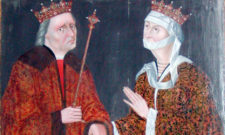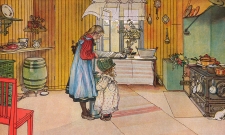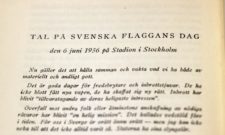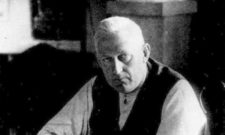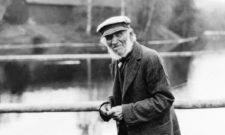Shop our historical maps

Feb
Share on FacebookShare on WhatsAppShare on TelegramShare on X (Twitter)Lyssna på ”Vårt fria ord” på Spreaker. Nytt avsnitt ute där poddar finns! Först högläsning av C.V.A. Strandbergs dikt Vårt fria ord från 1856, sen eftersnack om kampen för yttrandefrihet, om Vilhelm Moberg och vad han kallade det […]
Listen to "Our Free Word" on Spreaker.
New episode out where podcasts are! First reading of C.V.A. Strandberg's poem Our free word from 1856, then afterwards about the struggle for freedom of speech, about Vilhelm Moberg and what he called the time of the unfree word during the Second World War, and about alternative media past and present.
Nice listening!
For those who prefer text:
This poem could have been written yesterday, but it could also have been written 50, 100 or 500 years ago.
As far back as our written history, we can see how those in power have fought free speech.
Free speech has been fought by people who have something to lose by speaking the truth. People with a lot of power. People who want more power. People who, for various reasons, shun the light of truth.
The truth about injustice and oppression, about lies and deceit.
The time of the unfree word, Vilhelm Moberg called the time during the Second World War when free speech was silenced by state censorship.
Moberg writes in Eskilstuna-kuriren on 28 February 1941, in an article with the headline "Silence reigns in the country":
So much so that a democratic government and an elected parliament demand that we accept the old black ghost of censorship - a ghost that we have heard about but never really believed in, that has suddenly risen on Swedish soil as if from the underworld. Censorship means that all printed matter, including books and pamphlets, must be examined by the authorities before being printed, and that free speech can be stifled at will. What then remains of freedom?
The Swedish government silenced voices critical of Germany and Hitler, and of the Swedish government's inaction in allowing German troops to travel through Sweden on Swedish railways, for example. They did not want to offend the Chancellor and risk a German invasion of Sweden.
You could say that Swedish politicians were also concerned about the image of Sweden at that time, and there was no place for the truth.
A quote from the same article:
The country needs calm, courageous citizens - but neither calm nor courage is produced by our governmental, negative propaganda, whose soul is an institution for the suppression of facts. There is an unparalleled kind of propaganda among free peoples: to tell the truth!
Vilhelm Moberg himself found it increasingly difficult to get his texts published. But two newspapers where his voice was heard were in the aforementioned Eskilstuna Kuriren, and in Göteborgs Handels och Sjöfarts Tidning, where editor-in-chief Torgny Segerstedt was at the helm.
Torgny Segerstedt was also concerned about free speech and Swedish freedom. During the war, a number of his newspapers were confiscated by the state. But already in 1934, one can read in one of his articles, and I quote:
The freedom to think and to express one's thoughts is above all else. It is the lifeblood of humanity. Without this atmosphere of freedom, the spiritual life withers away. All things can be spared, but not this. Where it is touched, there is what makes us human, there is what makes us moral, there is life.
A few years later, Mr Segerstedt was named after King Gustav V himself, who tried to get Segerstedt to tone down a bit. That worked out well for the king.
Because free speech always finds a way.
The truth cannot be hidden under the chair, as the old saying goes.
And it was precisely free speech that the early labour movement and social democracy relied on in their first struggling decades.
Vilhelm Moberg tells 1941:
When the Social Democracy began to fight its way forward, free speech was its main means of struggle. Socialist editors were convicted countless times in freedom of the press cases and served hundreds of years in prison. Hjalmar Branting and Axel Danielsson were among these martyrs of freedom of the press. They led the struggle to victory, but victory would not have been possible without the free word.
Where voices cannot be heard, alternative media naturally emerge. The early labour movement had no one to speak for them in the newspapers of the day. So they created their own newspapers.
The history of the emergence of alternative media in the 19th and 20th centuries I thought I would do a video section on in the future. It's quite fascinating, and not least relevant as we see that history repeating itself today.
The alternative media of the past have become the establishment of today, and where there were voices that could not be heard, new alternative media have emerged as their mouthpieces.
We also see today an establishment that looks unfavourably on the rapid rise of its new competitors. We see how the alternative media of our time are being fought. We see free speech being fought.
In our time, it is not voices critical of Germany that encounter patrols from the enemies of free speech. No, when the mean fi appears, one can guess with a fair degree of probability that the subject in question is migration policy and tax-subsidised immigration.
We live in a country where both ordinary people and the country's top leadership have been and are afraid to express their views - to tell the truth - to even want search for the truth.
For fear of being called a racist, or worse. For fear of losing your job and friends. For fear of the totalitarian and intolerant forces that live and thrive within the Swedish left. And it is these forces that bear the ultimate blame for the direct and indirect censorship and self-censorship that has lain like a wet blanket over Sweden for many years.
People have lost their jobs. People have lost friends and their reputation. People have lost one's life in Sweden because people have been afraid to speak out.
These unfair and largely neo-Marxist forces have had and still have free rein in state institutions - not least in public service, and they also dominate many of the country's editorial offices - the so-called free media. These are forces that must be fought by everyone who protects free speech, who protects the truth, who protects reason, who protects their own future. Evil must be resisted.
Moberg ends his article in Eskilstuna-kuriren with the following words, and they may also end this section:
The right to speak and write freely and to know the truth in our newspapers - was it not precisely this right that we were supposed to defend?
I wanted to put this question to all members of our government, of our parliament.
Is our people not united in defending their freedom, their Swedish uniqueness, their culture, their spiritual and material values? Do we not agree that we shall fight for all this to the death?
This free country is ours, and ours it shall remain!
Don't let anyone silence your thoughts.
Have a nice weekend everyone.
Do you want to help Allmogen grow - so I can do much more to protect our history and free speech? Become a supporting member today.
Subscribe to YouTube:
If you appreciate Allmogens independent work to portray our fine Swedish history and Nordic culture, you are welcome to buy something nice in the shop or support us with a voluntary donation. Thank you in advance!
Support Allmogens via Swish: 123 258 97 29
Support Allmogens by becoming a member
Support Allmogens in your will
